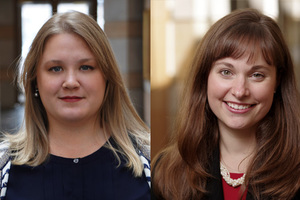 Ph.D. students Emily Maiden and Kristina Hook
Ph.D. students Emily Maiden and Kristina Hook
The University of Notre Dame is sending nine students abroad to address pressing global development challenges through research as part of a grant with the United States Agency for International Development (USAID), managed by the Pulte Institute for Global Development.
Partnering with host organizations on four continents in seven countries, the nine Notre Dame students will complete research projects throughout 2017 and 2018. The students and their research projects are as follows:
Tracy-Lynn Cleary, a doctoral student in the Department of Chemistry will travel to Kenya to develop a paper analytical device (PAD) that has the capability of detecting low quality oxytocin in an affordable, safe, and field-friendly manner to be implemented in birth clinics around the world. She will be supported by Marya Lieberman, a professor of surface chemistry.
Jenna Davidson, a doctoral student in the Department of Biological Sciences will travel to Indonesia to study which mosquito vectors are present in Indonesia and their associated behaviors, as well as what arthropod-borne viruses are being transmitted by mosquitos. She will be supported by Neil Lobo, a research associate professor of medical entomology.
Lauran Feist, an undergraduate senior student in the Departments of Political Science, Economics, and Romance Languages will travel to Argentina and Brazil, to study the comparative power of governors in the two countries and their role in shaping public policy outcomes. She will be supported by Scott Mainwaring, the Eugene and Helen Conley Professor of Political Science.
Catherine Flanley, a doctoral student in the Department of Biological Sciences will travel to Brazil to join a laboratory group, which is developing sandfly age-related gene-expression markers so that researchers can more accurately estimate the age of field caught sandflies. These age markers will allow researchers to determine the efficacy of plant-derived, glycoside-baited traps in decreasing the longevity of field sandfly populations, frequent carriers of visceral leishmaniasis, which they hope will reduce transmission rates. Flanley will be supported by Mary Ann McDowell, an associate professor of immunoparasitology and vector biology.
Kristina Hook, a doctoral student in the Department of Anthropology and the Kroc Institute for International Peace Studies will travel to Ukraine to analyze the effects of the 1930s Holodomor – a human-caused famine in Joseph Stalin’s Soviet Ukraine that killed an estimated 2.5 to 7.5 million people – on Ukraine's collective political identity in the modern post-Soviet landscape. She will be supported by Ernesto Verdeja, an associate professor of political science and peace studies.
Samuel Lucas, an undergraduate pre-professional studies senior student in the College of Science will travel to Malawi to review the progress of an NDIGD project, funded through a grant by Catholic Relief Services, focused on the capacity of local government councils that deal with local development, civil protection, and natural resource management. He will be supported by Jaimie Bleck, an assistant professor of political science.
Emily Maiden, a doctoral student in the Department of Political Science and the Kroc Institute will travel to Malawi to determine what an effective implementation strategy might look like that could strategically combat the issue of child marriage. She will also be supported by Professor Bleck.
Lilian Ramos, a Master of Science in Global Health student in the Eck Institute for Global Health will travel to Uganda to assess the perceptions of nursing students and tutors about incorporating mHealth as a tool to improve palliative care services and delivery, as well as the feasibility of integrating mHealth training into the current curriculum of a diploma in palliative care program. She will be supported by Lacey Ahern ‘03, the associate director of global health training at the Eck Institute.
Megan Wright, a Master of Science in Global Health student in the Eck Institute will travel to Uganda to follow up with mothers and newborns post-cesarean section during the post-discharge period. She will use hospital data and will conduct a home survey for mothers and newborns to determine cause-specific mortality and morbidity, which will be used to identify necessary follow-up care practices post-cesarean section. Wright will be supported by Dr. Brian McCarthy ‘68, an adjunct professor.
Locally based organizations will host each of the fellows and work with them to develop innovative solutions to the various global development challenges the fellows hope to address.
Notre Dame is one of six universities selected by USAID’s Global Development Lab to offer these fellowships, which are officially known at the University as the USAID | Notre Dame Global Development Fellowships. NDIGD has managed this fellowship program for the University since 2014.Locally based organizations will host each of the fellows and work with them to develop innovative solutions to the various global development challenges the fellows hope to address.
“Today’s global development challenges need bold, innovative thinkers and solutions,” said NDIGD managing director, Michael Sweikar. “NDIGD is thrilled to once again support some of the University’s most promising students in this opportunity to develop their research and create meaningful change.”
The Notre Dame Initiative for Global Development — an integral part of the new Keough School of Global Affairs at the University of Notre Dame — promotes human development and dignity among people worldwide through applied innovations, impact evaluation, education and training that help build just and equitable societies.
Originally posted at Notre Dame Initiative for Global Development.